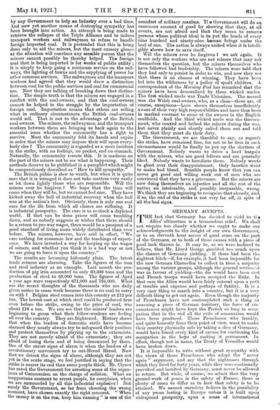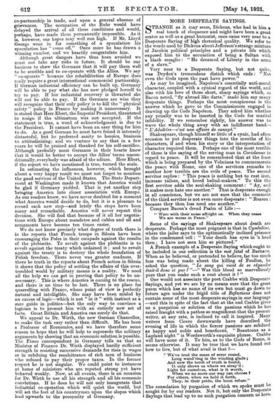GERMANY ACCEPTS. T HE fact that Germany has decided to yield
to tl e Allies' ultimatum is a tremendous relief. We shall not enquire too closely whether we ought to make our acknowledgments to the insight of our own Government, or to an eleventh hour access of good sense on the part of the Germans, or to both of these causes with a piece of good luck thrown in. It may be, as we were inclined to believe, that Mr. Lloyd George gambled too much upon the chance of Germany yielding. If there had been the slightest hitch—if, for example, it had been impossible for the new German Chancellor to collect in time a majority among the various groups, although the general sentiment was in favour of yielding—the die would have been cast and French troops would have occupied the Ruhr. In that case the Allies would have fairly entered upon a path of trouble and expense and perhaps of futility. It is a very easy thing to march into a country, but it is a very difficult thing to get out again. Even though the majority of Frenchmen have not contemplated such a thing as annexing a piece of German territory, the force of cir- cumstances might have kept the French so long in occu- pation that in the end all the evils of annexation would have been produced. Those Frenchmen who frankly, and quite honestly from their point of view, want to make their country physically safe by taking a slice of Germany, would have found every kind of excuse for continuing the occupation in the hope of making it permanent. In effect, though not in name, the Treaty of Versailles would have broken down.
It is impossible to write without great sympathy with the views of those Frenchmen who adopt the " never again " argument, and say that the nightmare through which they lived for forty years, while they were continually provoked and insulted by Germany, must never be allowed to return. But while, of course, we admit that the very ground-work of peace is the safety of France, there is plenty of room to differ as to how that safety is to be attained. We cannot ourselves believe in the possibility of any peace lasting in Europe unless it is built upon widespread prosperity, upon a sense of international co-partnership in trade, and upon a genera! absence of grievances. The occupation of the Ruhr would have delayed the arrival of all these conditions and would, perhaps, have made them permanently impossible. As it is, however, our hopes may well rim high. If Mr. Lloyd George went in for something of a speculation his speculation has " come off." Once more he has drawn a winning number, and we heartily congratulate him. Although great dangers have thus been avoided we must not take any risks in future. It should be our business to show the Germans that it will pay them well to be sensible and to co-operate with the Allies. We say " co-operate " because the rehabilitation of Europe does really require a great international commercial partnership. If German industrial efficiency can be built up, Germany will be able to pay what she has now pledged herself to try to pay. If her industrial recovery is thwarted she will not be able to pay. If the Germans are wise they will recognize that their only policy is to kill the " physical safety " policy in France by making it unnecessary. It is stated that Herr Ebert, the Imperial President, threatened to resign if the ultimatum was not accepted. If the statement is true, a word of acknowledgment is due to the President. It cannot have been an easy thing for him intensely distasteful, do. As a good German he must have found it ntensely distasteful, but he preferred sanity to heroics, business to attitudinizing; and we venture to say that in a few years he will be praised and thanked for his self-sacrifice. Although probably most Germans in their hearts knew that it would be better to accept the Allies' terms uncon- ditionally, everybody was afraid of the odium. Herr Ebert, if the report we have mentioned is true, turned the scale.
In estimating the influences, however, which brought about a very happy result we must not forget to mention the good services of .the United States. The State Depart- ment at Washington made it known that America would be glad if Germany yielded. That is yet another step bringing America into closer association with Europe. As our readers know, we have never doubted for a moment what America would decide to do, but it is a pleasure to record each new step—and lately the steps have been many and remarkable. America will never repent this decision. She will find that because of it all her negotia- tions with Europe about mandates and cables and oil and armaments have become ten times easier.
We do not know precisely what degree of truth there is in the reports that French troops in Silesia have been encouraging the Poles in their escapade against the results of the plebiscite. To revolt against the plebiscite is to revolt against the treaty which ordained it ; and to revolt against the treaty is to destroy the whole foundation of Polish freedom. There never was greater madness. If there be truth in the reports about French action in Silesia it shows that the policy of settling the affairs of this over- troubled world by military means is a reality. We need all the help we can get in proving that policy to be un- necessary. This is where America is coming to the rescue, and there is no time to be lost. There is no place for quarrelling with France, whose point of view is perfectly natural and intelligible. She may have been misled by an excess of logic—which is not " in it " with instinct as a sure guide in politics—but the only way to convince a logician is to present him with an entirely new set of facts. Great Britain and America can surely do that.
We appeal to Dr. Wirth, the new German Chancellor, to make the task easy rather than difficult. He has been a Professor of Economics, and we have therefore some reason to hope that he will help to supersede the military arguments by showing that an, economic solution is possible. The Times correspondent in Germany tells us that as Minister of Finance Dr. Wirth displayed hardly sufficient strength in resisting successive demands for rises in wages or in subduing the recalcitrance of rich men of business who refused to pay their proper taxes. In the former respect he is not singular. We could point to instances at home of ministers who are reputed strong yet have behaved weakly. Now, at all events, there is an occasion for Dr. Wirth to use all his strength and all his economic convictions. If he does he will not only inaugurate that industrial co-operation which will quiet the world, but will set the feet of his countrymen upon the slopes which lead upwards to the prosperity of Germany.



































 Previous page
Previous page